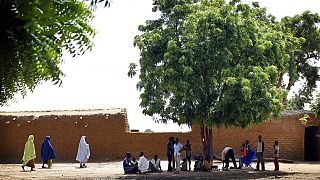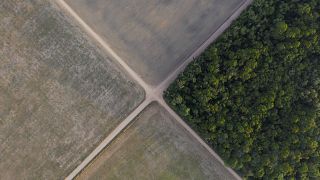Kenya
Kenya is battling to survive bio-diversity loss and climate change, and nowhere is this more obvious than here in Kitui County.
The riverbed is completely dry and Peter Kakai and his friend are digging deep, with no sign of water yet.
Kenya, like other countries in the East African region, is suffering from drought with three years of low, or no rainfall in some areas.
Local, Peter Kakai remembers that when he was young his local river was teeming with life and it flowed throughout the year.
In fact, he recalls that then the river flooded, denying his family access to the neighbouring villages.
Now, it’s very different, the river that fed them and provided water has dried.
According to Kakai, he wakes up early each day to keep digging a well.
It’s deep and the walls are at risk of collapsing.
Kakai blames deforestation, the relentless use of trees for human use.
“Long time ago, this river used to flow throughout the year until sometimes it was uncrossable. But when people started uncontrolled deforestation, the river dried up and now we are digging 7 to 8 feet and beyond to get water. Now it looks like we have to replant our old trees like the indigenous trees so that we can see if we get water and sufficient rainfall as before,” he says.
Now a government nationwide campaign is underway to plant 15 billion trees in Kenya by 2030.
It’s a mammoth task and everyone is being asked to take part.
At this funeral for Monica Malonza, her family is commemorating her death by planting a tree for each of the 103 years she lived.
The Plant Your Age Initiative is being led by the Green Africa Foundation which says it’s already planted millions of trees.
The Foundation is a non-government organisation created in 2000 with the aim of creating community solutions to the continent’s environmental challenges.
Addressing the mourners, the organisation’s James Ngumbau explains how each person can contribute a legacy by planting a tree for every birthday since their birth.
“She has rested at 103 years of age. That's why I have come today so that we can plant trees for her, and I will bring more seedlings towards the onset of the rainy season so that we can always celebrate her through tree planting. Next year as you celebrate her anniversary, you can plant another 103 trees in her memory, the following year 103, and that’s how you will be remembering her,” he tells the mourners.
Kenya’s tree planting programme was prompted by the United Nations COP27 climate conference in Egypt in November 2022.
Countries agreed to financially assist vulnerable countries like Kenya, for loss and damage caused by the worst impacts of climate change.
This included a pledge to reverse forest loss by 2030, with the Intergovernmental Science-Policy Platform on Biodiversity and Ecosystem Service (IPBES) warning that over 1 million animal and plant species now face extinction.
Malonza’s family is keen to take part in efforts to reverse environmental damage.
Her son Mwanzia Malonza is now 70 and intends to plant as many trees on his own behalf.
He says: I want to thank the Plant Your Age champion for coming and educating us about our environment here in Kenya. Now because I am also elderly, I will start planting 70 trees which represent my 70 years of age.”
It’s hoped the trees planted today will have a beneficial impact on the environment for younger generations like 10-year-old Victoria Kilonzo, the great-great-grandchild of Monica Malonza.
Now she has a message for her generation.
She says: “We should look after our environment. We should save some water for the trees, we should not cut down trees and if you cut down a tree you should replant another tree to replace that tree which you have cut down.”
This tree nursery is supported by Climate Resilient Agribusiness for Tomorrow CRAFT, which says it aims to invest in climate smart agricultural solutions.
CRAFT was created by SNV a global NGO which aims to support the UN’s Sustainable Development Goals initiative.
Its researcher and agronomist, Dorcas Mumbe says the aim is to re-establish trees which are resilient in Kenya’s climate, species such as Terminalia brownie and Melia Volkensii.
Mumbe says: “In this nursery, we have so many indigenous trees which have the highest carbon sinks, we are trying to advocate for the people in our area, and also the people in Kenya, because of what we call tree diversification whereby different trees do well in different areas. That’s why we are trying to look at the local, what is doing well in that area.”
According to Mumbe, the tree planting can encourage biodiversity.
“That’s why we are trying to advise people that when they grow these trees, we are able to retain back the biodiversity, the way it used to be. The natural ecosystem which used to harbour animals, which used to be the home of animals, the home of so many things, and as you also grow these trees there is no much stress of water, they require minimal amounts of water,” she explains.
Mumbe warns a failure to act is not an option, nature she says is “unforgiving”.











00:22
Boniface Kariuki, a Kenyan mask vendor shot at close range laid to rest
11:17
Bridging the legal gap in Africa’s digital boom {Business Africa}
Go to video
First Malaria treatment for babies approved
02:16
Kenya's William Ruto faces growing discontent over economy and police brutality
02:05
In Zimbabwe, metal scrap collecting is reducing environmental pollution
00:28
Nairobi hawker shot at close range by police declared brain dead